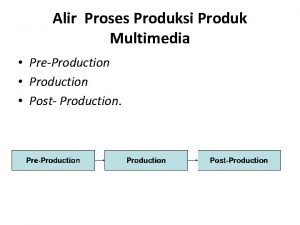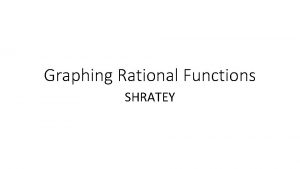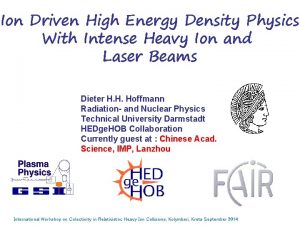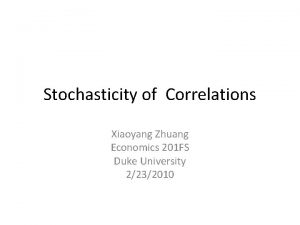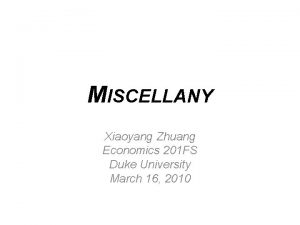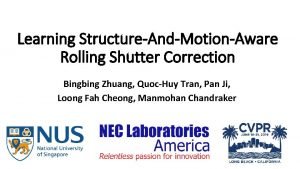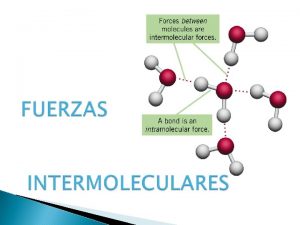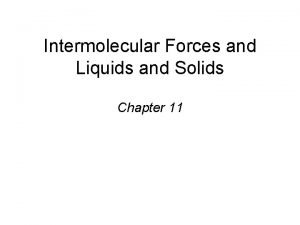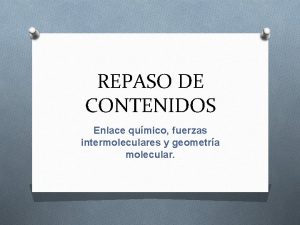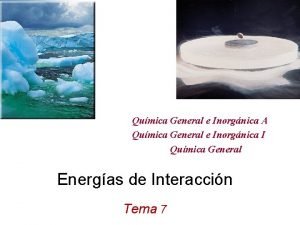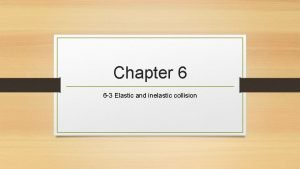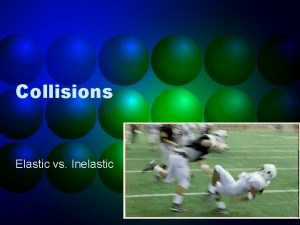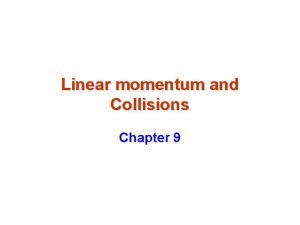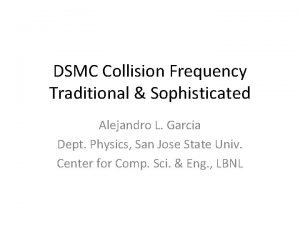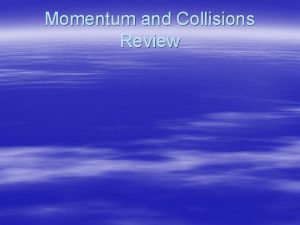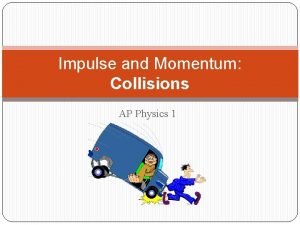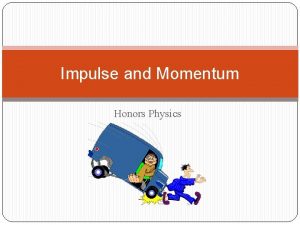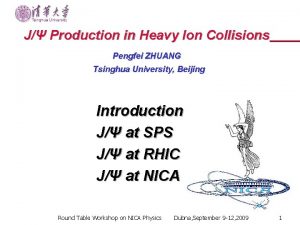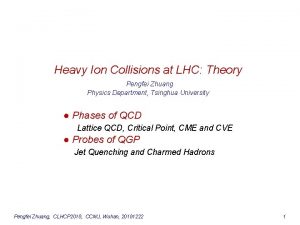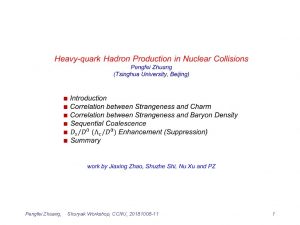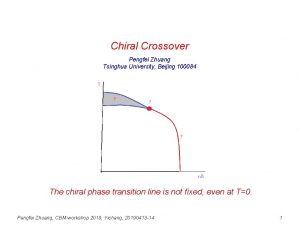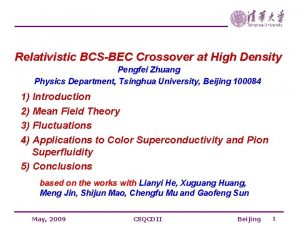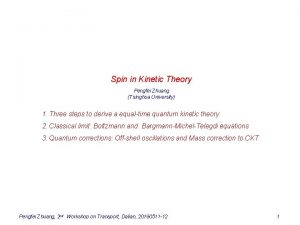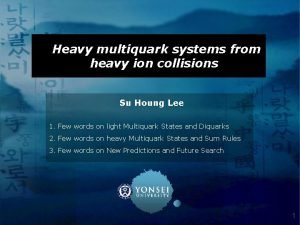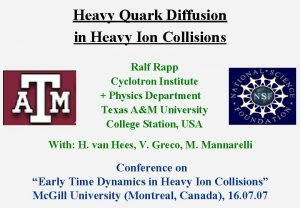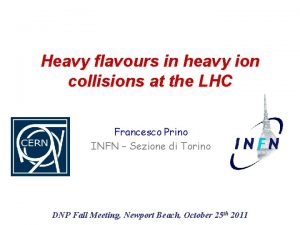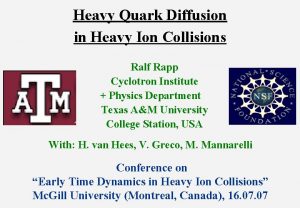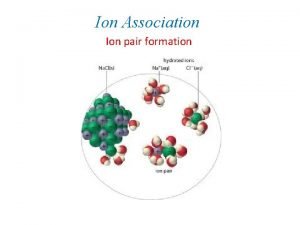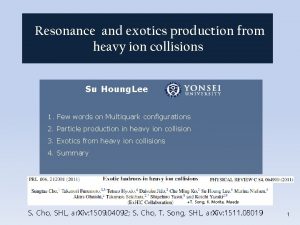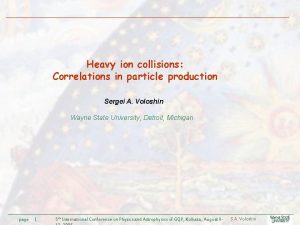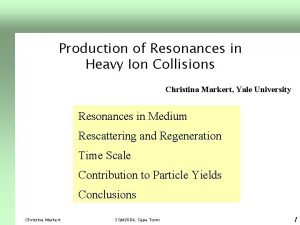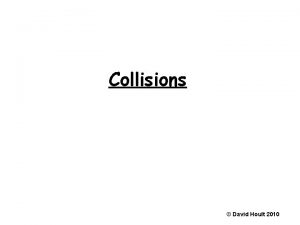J Production in Heavy Ion Collisions Pengfei ZHUANG


















- Slides: 18

J/Ψ Production in Heavy Ion Collisions Pengfei ZHUANG Tsinghua University, Beijing Introduction J/Ψ at SPS J/Ψ at RHIC J/Ψ at NICA Round Table Workshop on NICA Physics Dubna, September 9 -12, 2009 1

importance of heavy quarks B. Mueller, nucl-th/0404015 ● produced only in the initial impact, and no extra production in the later evolution a probe of early thermalization and a probe of QGP ●produced via hard process rather solid ground Matsui and Satz 1986: J/Ψ suppression as a signature of QGP formation in HI Round Table Workshop on NICA Physics Dubna, September 9 -12, 2009 2

J/Ψ motion in heavy ion collision hot nuclear matter effects cold nuclear matter effects ● both initial production and regeneration both normal suppression and anomalous suppression Round Table Workshop on NICA Physics Dubna, September 9 -12, 2009 ● 3

J/Ψ at SPS: normal suppression NA 38 mechanism: multi-scattering between J/Ψ and spectator nucleons R. Vogt, Phys. Rept. 310, 197(1999) C. Gerschel, J. Hufner, Annu. Rev. Nucl. Part. Sci. 49, 225(1999) conclusion: nuclear absorption can well explain the J/Ψ yield in p-A and light nuclear collisions at SPS energy ! Round Table Workshop on NICA Physics Dubna, September 9 -12, 2009 4

J/Ψ at SPS: anomalous suppression NA 38 model 1: Debye screening (Matsui & Satz, 1986) at T=0 at T≠ 0 model 2: threshold model (Blaizot, Dinh, Ollitrault, 2000) model 3: comover interaction Capella, Feireiro, Kaidalov, 2000) Round Table Workshop on NICA Physics Dubna, September 9 -12, 2009 5

J/Ψ at RHIC: regeneration there about 10 pairs of c quarks in a central Au-Au collision at RHIC energy and more than 100 pairs at LHC energy important J/Ψ regeneration at high energies: in QGP in hadron gas mesons the competition between J/psi suppression and regeneration leads to the question: J/Ψ suppression or enhancement at high energies? model 1: statistical production at Tc, no initial production Andronic, PBM, Redlich, Stachel, 2007 model 2: continuous production inside QGP with anomalous suppression, no initial production Thews, Mangano, 2006 model 3: two-component model, initial production regeneration Grandchamp, Rapp, Brown, 2004 regeneration in hadron gas is important too Bratkovskaya, Cassing, Stoecker, 2003 Round Table Workshop on NICA Physics + the competition between suppression and regeneration explains well the data Dubna, September 9 -12, 2009 6

J/Ψ at RHIC: is regeneration necessary ? I J/Ψ puzzle 1: almost the same suppression at SPS and RHIC ! explanation with regeneration: at RHIC, stronger suppression and stronger regeneration explanation without regeneration: Schroedinger equation for c cbar with lattice potential gives the charmonium dissociation temperature: Kaczmarek et al. , 2003 Karsch, Kharzeev, Satz, 2006 if TSPS< TRHIC<TJ/Ψ , the suppression at SPS and RHIC will be the same and it explains the puzzle 1. it looks not necessary to introduce the regeneration. Round Table Workshop on NICA Physics Dubna, September 9 -12, 2009 7

J/Ψ at RHIC: is regeneration necessary ? II J/Ψ puzzle 2: stronger suppression at forward rapidity ! explanation with regeneration: stronger regeneration at mid rapidity Liu, Xu, Zhuang, 2009 mid-rapidity forward rapidity explanation without hot nuclear matter effects: different J/Ψ production in p. A and AA from pp Kharzeev, Levin, Nardi, Tuchin, 2009 strong J/Ψ suppression even at T=0 ! Dubna, September 9 -12, 2009 8 Round Table Workshop on NICA Physics

J/Ψ at SPS: transverse momentum for J/Ψ yield, almost all the models – with and without the assumption of QGP and without regeneration mechanism – describe the observed suppression, after at least one parameter is adjusted. the transverse momentum distribution which depends more directly on the production and suppression mechanisms contains more information on the nature of the medium and J/Ψ and may help to distinguish between different scenarios. transport model (Hufner, Zhuang, 2003; Zhu, Xu, Zhuang, 2005): transport equation for JΨ and hydrodynamics for QGP very important leakage effect ! no regeneration at SPS regenerati suppression on pt enhancement at SPS Round Table Workshop on NICA Physics Dubna, September 9 -12, 2009 9

J/Ψ at RHIC: transverse momentum Yan, Xu, Zhuang, 2006; Liu, Xu, Zhuang, 2009 pt broadening pt suppression strong pt suppression low pt is controlled by both initial production and regeneration high pt enhancement is induced by Cronin effect in initial production + regeneration explain both the yield and transverse momentum distribution Round Table Workshop on NICA Physics Dubna, September 9 -12, 2009 10

J/Ψ at NICA: cold nuclear matter effects ● LHC: almost only regeneration, sensitive to hot nuclear matter RHIC: both initial production and regeneration the calculation needs a quite accurate fine-tuning between the two production mechanisms SPS: almost only initial production NICA: only initial production, sensitive to cold nuclear matter ● is the rapidity dependence at NICA similar to that at RHIC? 2 gluon fusion mechanism: no 3 gluon fusion mechanism: yes (Kharzeev et al. , 2009) the rapidity dependence can distinguish from the initial production mechanisms ● normal vs anomalous suppression at NICA longer collision time (~1 fm), important (dominant) nuclear absorption, shorter life time of hot matter, weaker anomalous suppression Round Table Workshop on NICA Physics Dubna, September 9 -12, 2009 11

J/Ψ at NICA: others ● pt distribution at NICA LHC: strong pt suppression due to thermalized regeneration NICA: strong pt enhancement due to Cronin effect ( gluon multi scattering ) and leakage effect ( high momentum particles can escape the hot medium ). the life time of hot matter is short at NICA but long at RHIC and LHC, the leakage effect is therefore more important at NICA. ● mixed phase at NICA the phase transition at NICA may be of first order RHIC SPS life time of mixed phase 4. 5 fm fraction of anomalous suppression 7% 30% long life time of mixed phase and short life time of quark matter the suppression in the mixed phase becomes more important at NICA ! Round Table Workshop on NICA Physics Dubna, September 9 -12, 2009 12

conclusion cold and hot nuclear mater effects on J/Ψ in high energy nuclear collisions are still not clear at NICA: 1) Transverse momentum and rapidity distributions can distinguish from J/Ψ production mechanisms: * pt enhancement due to Cronin effect and strong leakage effect * stronger suppression at forward rapidity (3 gluon fusion) or at mid rapidity (2 gluon fusion)? 2) Nuclear absorption dominates the J/Ψ suppression and anomalous suppression happens mainly in the mixed phase 3) non-thermalized J/Ψ has small (zero) elliptic flow. Round Table Workshop on NICA Physics Dubna, September 9 -12, 2009 13

thanks for your attention Round Table Workshop on NICA Physics Dubna, September 9 -12, 2009 14

centrality dependence at SPS Zhu, Zhuang, PRC 67, 067901(2003) J/psi R_AA and <p_t^2> at SPS energy as functions of centrality and p_t can be well described by nuclear and medium absorption, without regeneration. Round Table Workshop on NICA Physics Dubna, September 9 -12, 2009 15

dominant regeneration at LHC while initial production and regeneration are equally important at RHIC, the J/ psi yield at LHC is characterized by the regeneration only! Liu, Xu, Zhuang, PLB, 2009 and QM 2009 * J/psi is controlled by regeneration * J/psi yield at LHC increases with centrality Round Table Workshop on NICA Physics Dubna, September 9 -12, 2009 16

initial production & nuclear absorption are included in initial condition Round Table Workshop on NICA Physics Dubna, September 9 -12, 2009 17

near side correlation in s. QGP Zhu, Xu, Zhuang, PRL 100, 152301(2008) * c quark motion in QGP: for strongly interacting quark-gluon plasma: we take drag coefficient to be a parameter charactering the coupling strength * QGP evolution: ideal hydrodynamics ● at RHIC, the back-to-back correlation is washed out. ● at LHC, c quarks are fast thermalized, the strong flow push the D and Dbar to the near side! large drag parameter is confirmed by R_AA and v_2 of non-photonic electrons (PHENEX, 2007; Moore and Teaney, 2005; Horowitz, Gyulassy, 2007). Round Table Workshop on NICA Physics Dubna, September 9 -12, 2009 18
 Sebutkan 3 proses produksi multimedia
Sebutkan 3 proses produksi multimedia Ratey rational functions
Ratey rational functions Heavy ion
Heavy ion Xiaoyang zhuang
Xiaoyang zhuang Xiaoyang zhuang
Xiaoyang zhuang Inner life of the cell
Inner life of the cell Bingbing zhuang
Bingbing zhuang Chemdraw clean up reaction
Chemdraw clean up reaction Fuerzas dipolo dipolo ejemplos
Fuerzas dipolo dipolo ejemplos Example of ion dipole
Example of ion dipole Ion dipolo
Ion dipolo Qumica
Qumica Types of collision
Types of collision Elastic vs inelastic vs perfectly inelastic
Elastic vs inelastic vs perfectly inelastic Energy loss formula
Energy loss formula Collisions
Collisions A roller coaster climbs up a hill at 4m/s and then zips
A roller coaster climbs up a hill at 4m/s and then zips Law of impulse
Law of impulse Relationship between momentum and impulse
Relationship between momentum and impulse
